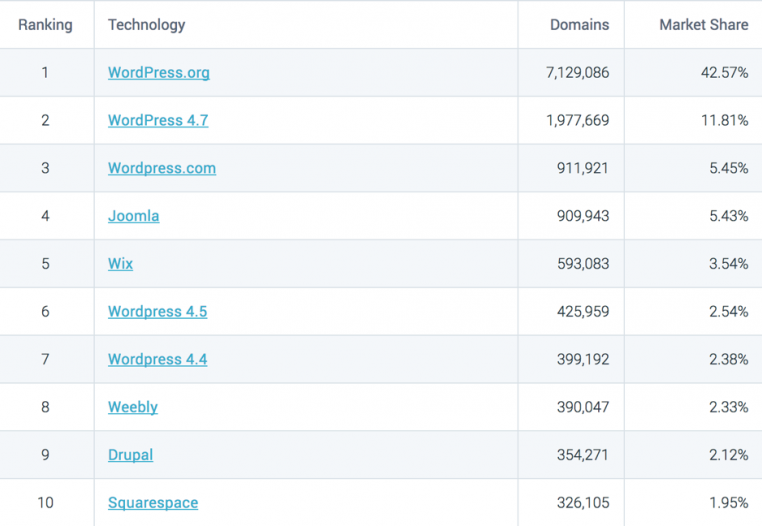Advantages of Choosing an Open-Source App Builder

You’re launching a new business and you want to create a mobile application for you or your customers? Many tools exist to achieve it, but do you know the differences between them and what it implies for your business?
Indeed, you will have to choose between two main actors of the App creation market:
●The SaaS App Maker Solution (DIY)
●The Open-source App Maker solution (CMS)
When you create a new website or a smartphone Application, you can either decide to subscribe to a company which will provide you an access to their software and build what you want online in a renting optic, or you can download an open-source software that you will own and host on your server.
Off the totality of the web sites, more than 70% are created via a professional process by pro-developers platforms in open-source. These platforms offer great tools for building complex websites including custom design and CMS such as WordPress, Joomla and Drupal. One of these CMS actors stands out: WordPress, by powering more than 26.4% of the web with a total of 59.4% market share. On the contrary, only 3% of the websites are created via a SaaS process.
One can think using a DIY online tool can be a good option in term of quality and price ratio. However that's not the good approach when it comes to creating your marketing and communication tools. It's like launching a restaurant and choose to create your menu depending on what you can cook with this ready-to-use kitchen. That's the opposite way to succeed. The way that leads every business to succeed is to think “bottom-up”: What is the market looking for? What can I bring to my clients to differentiate my business in this crowded market? etc. and then to build the right solutions from the ideas that emerged. Obviously, cost saving is a good thing because your business needs to be profitable, but it must not be THE thing that leads your marketing strategy.
Thus, if you take a closer look, the DIY tools might not be the ideal solution for your business. As outlined by Dave Sloan, businesses have rejected DIY tools regarding the websites market, and these data from Datanize highlight this rejection:

Top ten technologies used for creating websites (source: )
If this is the case for the website creation market, what about the Apps creation market? For now, the SaaS dominates this market in full expansion thanks to its ease of use and its cost that seems really affordable even for a small business.
But a connexion can be made between the website and the mobile app markets. Here are the three reasons why we advise you to use an open-source app maker.
1. Customization possibilities
A SaaS provider will give you access to all the features they developed on the App builder, so you will be able to develop your application using these features. However, if you want to add a new feature to your application, you must be patient because you won’t be able to add anything before they develop it. That’s one of the biggest mistake of the SaaS solution. So, if a client wants to add a feature to his application that the company hasn’t developed yet, you will have to tell him that it’s not possible…
The positive point of the SaaS solution is the simplicity of use of these app makers. Indeed, the DIY tools allow you to create beautiful applications with a great design without any design or technical development skills.
Nevertheless, many companies try the trial version of the SaaS app maker but finally decide to opt for an open-source app maker because of this lack of customization.
Indeed, with a CMS solution you have a total control on your application. As indicated in the name, when you download an open-source software, the full source code of the software is delivered to you and you can edit it on your own, so you have the features offered with the software, but you can build your own ones. For example, you have a restaurant and you want to add features for your client’s orders? Don’t wait, you can do it if you have the skills needed or you can contact an agency, an independent developer or a freelancer to develop it for you.
Some DIY online tools provide options for adding your own features and creating your own customizations, but most of the time these developments have to be shared with other users. When you own an agency, your clients' privacy is gold and sharing what you've done for a specific client is something that cannot be considered. You may prefer an environment that is secured, where you can create the specific customizations needed by your client rather than exposing all of these changes to other users or, even, competitors.
Keep in mind that if a software is downloaded and used by a high number of people, a community is created and developers can create and share new features with each other. It avoids dependence on the company which created the software, and makes of this open-source software a tool in constant evolution.
DIY online tools have one goal: simplification. 99% of the users have absolutely no technical knowledge and want to create simple solutions. The ones who want to develop more complex tools or even who have specific requirements understand quickly they have to use other services. Open-source app makers can be seen as easy-to-use solutions as well, however, thanks to the community behind, more tools are brought to you to extend the overall possibilities, providing you a larger range of features and options.
2. Reliability
When you use a SaaS App Maker, it means that you rent a software, you’re not the owner of this software and you only use it as a “tenant”. You will pay a monthly subscription and will be able to use it on your own within the barriers the company set up.
But what if the company decides to go out of business? What does your mobile application become then? You will basically risk losing everything because the app will be hosted on your provider’s server.
Even if you’ve published your application, once your provider shuts it down you may lose everything you built. And it will not be professional to explain to your customer that their website or application doesn’t work anymore because your provider is out of business and you can’t do anything against that.
An open-source app maker means that you own the software, so you will not be dependent from your provider as you would be in the case of an online platform. Even if the company goes out of business, you still have access to your application(s).
No worries, that does not mean that you’re all alone once you purchased the software! Basically, an open-source software is maintained by the team who created it, and they’re all open to help you if you have an issue with the software, unlike with the SaaS solution where the people’s “contribution” is only the technology and the design of the app creator they brought, so don’t wait for them for specific support for your project, you won’t get it.
With an open source App builder, the company which provides you the CMS will support you with the issues encountered. Hundreds of developers are also available all over the Internet if you want to fix any issue or add any specific feature. In addition to that, they often have forums, blogs, videos and much more so you can Google an issue to find a fix by yourself.
3. Build an asset for your company
Another important point in the choice of your provider: the propriety question. Indeed, when you get a subscription to a DIY tool, the software doesn’t belong to you so you don’t create a real added value for your company. To be clearer if you want to sell your company, the only thing you’ll be able to put forwards will be your clients because your application is your provider’s propriety.
No need to tell you that the best solution for your business is an open-source app maker. Indeed, you will own the software as well as the application you will have launched so no need to ask about the propriety question.
You should think about it as an investment and the risks behind it. You buy something that will bring you money back. By subscribing to an online platform, you only rent a product and you will have to give it back if the company stops their activity or if you want to go out of business and sell your company.
There are many reasons why you should opt for a open-source software, and if yours aren’t explained in this article, we would be glad to hear them! Whatever your motivations are, this is not by chance that the deviation of use for the website creation is so important between the open-source and the SaaS process. And the app building market will obviously follow the same path.